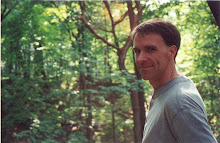New Haven, Connecticut: Gown and Town
The first thing I did when I got to New Haven was take a phone number out of my pocket and make a call. I knew no one in town, but the man who answered agreed to meet me for coffee and suggested a rendezvous site: the legendary bookstore-cum-coffee shop Atticus across from the campus of Yale University. Yale was home to four Hopper paintings I was here to see--more than any city besides the nation's capital of DC and the art capitol of New York. Rooms by the Sea depicts the view out a door open seemingly directly onto the ocean. Jo noted: "could be called 'The Jumping off Place.'"
Rooms by the Sea depicts the view out a door open seemingly directly onto the ocean. Jo noted: "could be called 'The Jumping off Place.'"  Rooms for Tourists shows a Gothic house looming out of the dark night, cinematically lit by lamps on the lawn and street; only a fool would inquire about rooms here.
Rooms for Tourists shows a Gothic house looming out of the dark night, cinematically lit by lamps on the lawn and street; only a fool would inquire about rooms here.  In Western Motel, a woman in a full-length dress formally twists toward the viewer on a bed before a picture window outside which a long-hooded car noses into the scene. The final Hopper here, Sunlight in a City Cafeteria,
In Western Motel, a woman in a full-length dress formally twists toward the viewer on a bed before a picture window outside which a long-hooded car noses into the scene. The final Hopper here, Sunlight in a City Cafeteria,  portrays a café, with a cadaverous woman at one table and an equally pale man smoking a cigarette at another. Both stare into space, unable to connect. Hopper wrote to the painting's buyer, "I think it's one of my very best pictures."
portrays a café, with a cadaverous woman at one table and an equally pale man smoking a cigarette at another. Both stare into space, unable to connect. Hopper wrote to the painting's buyer, "I think it's one of my very best pictures." Atticus roared with clattering plates, avid conversations, and babbling waitresses rushing around wearing T-shirts that read "censorship causes bad vision." Books and tiny café tables ringed the walls beneath bright fluorescent light. I took a seat at the epicenter of activity, a tiny square diner counter surrounding the grill. I could have plucked War and Peace off a shelf and read it entirely in the time it took to get served.
Atticus roared with clattering plates, avid conversations, and babbling waitresses rushing around wearing T-shirts that read "censorship causes bad vision." Books and tiny café tables ringed the walls beneath bright fluorescent light. I took a seat at the epicenter of activity, a tiny square diner counter surrounding the grill. I could have plucked War and Peace off a shelf and read it entirely in the time it took to get served.
So I interviewed the sallow-skinned, blond girl in her early twenties sitting next to me and staring into space. She was a Yale student, and when I asked her major, she replied flatly, "Security Studies." I had heard that Yale was a breeding ground for CIA agents, and I suspected that she would fit right in when she said that European nations are "happy our troops are there. Really." She pleaded the Fifth on my question about isolation in terms of United States policies abroad but did comment about isolation in New Haven.
"I don't know a lot about New Haven, and that might be a good sign that we at Yale are set apart and isolated. And Yale is, what, the fourth largest, uh, richest, university in the entire world? They could do a lot more for the city's economy. Some people say, 'Yale is reaching out.' But once you drive about ten minutes from Yale, you don't see that."
Her boyfriend nodded his dark eyes from below a bulging brow and a floppy white tennis hat. When I asked if he, too, was a student, he balked, "No. No no no. I'm from about 20 minutes away. I think people in New Haven are isolated. Socioeconomically: the haves and have-nots are separated. You see at Yale incredible disparity: the best of the best and worst of the worst, right next to each other, crossing paths down the street. You see people near campus who obviously (well it's terrible to stereotype but you kind of assume) don't go to Yale. And the people literally just passing them are probably going to go on to do something like be a scientist or something. And it's amazing how they both live right in the same area, but one is just so far away from the other. Yale's a very strange place.
"You're always isolated in some way," he continued. "Emotionally, people are isolated from one another because you can never really truly completely connect with another person. Even if you have good relationships, people who love you, you still can be feeling isolated from what goes on around you. They don't know who you are. Lots of people, you figure they're happy if they smile. But they're hiding their minds."
20081121
68 New Haven: Gown and Town
Subscribe to:
Post Comments (Atom)




No comments:
Post a Comment